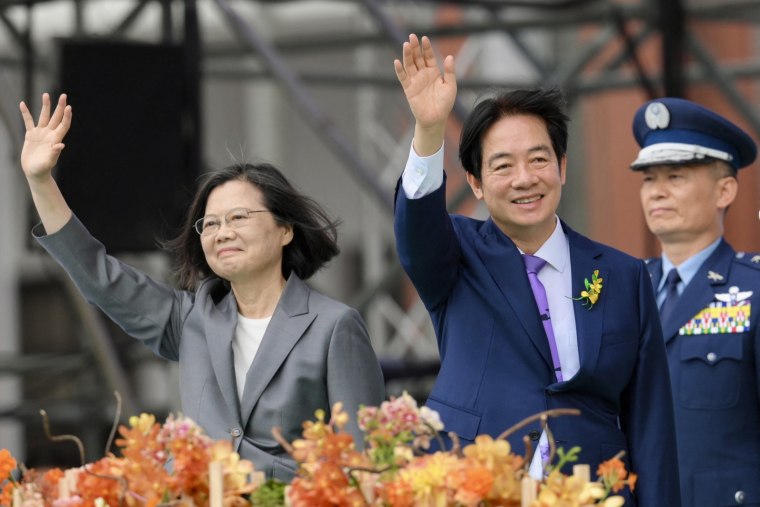Lai Ching-te was sworn in on Monday as the fifth popularly elected president of Taiwan, as Beijing demanded he make a “clear choice between peaceful development or confrontation.”
Lai took office alongside Vice President Hsiao Bi-khim. His Democratic Progressive Party (DPP) will be the first party to govern for a third consecutive four-year term since the democratic island held its first direct presidential election in 1996.
Lai and Hsiao won the election on Jan. 13 after taking about 40% of the vote.
During the inauguration ceremony at the Presidential Office, Lai wore a purple tie representing a butterfly native to Taiwan, as well as a yellow pin on his lapel depicting mustard flowers, a common plant across the island. He received two seals symbolizing his presidential power from the parliament speaker: the seal of the Republic of China and the seal of honor.
Both seals were brought to Taiwan when the Republican government fled to the island in 1949 after losing the Chinese civil war to Mao Zedong’s Communists.
The swearing-in ceremony was attended by outgoing President Tsai Ing-wen.
Also at the ceremony were former U.S. officials sent by President Joe Biden, lawmakers from countries including Japan, Germany and Canada, and leaders from some of the 12 countries that still maintain formal diplomatic ties with Taiwan, including Paraguay President Santiago Pena.
Lai, a four-term legislator and two-term mayor of Tainan, served as premier from 2017 to 2019 under Tsai, and became her deputy in 2020 during her second term. He is the first vice president to become president since Taiwan began holding direct presidential elections.
The former physician is viewed with suspicion by China’s ruling Communist Party.
Last week, China’s Taiwan Affairs Office said Lai, who it called the “Taiwan region’s new leader” had to make a clear choice between peaceful development or confrontation.
China regards Taiwan as a renegade province that should be reunited with the mainland, by force if necessary. Since separating from mainland China in 1949, Taiwan has been self-governing.
Tensions have increased since Tsai’s administration took power in 2016, refusing to acknowledge the “One China” principle. During the January election, China’s actions, including floating balloons through Taiwanese airspace and deploying aircraft carriers in the Taiwan Strait, exacerbated tensions and increased public dismay.
China has convinced several of Taiwan’s diplomatic allies to shift recognition to Beijing in recent years, leaving only 12 countries maintaining official relations with Taiwan.
During his winning speech in January, Lai vowed to maintain peace and stability in the Taiwan Strait, while keeping the cross-strait status quo.
His domestic challenges loom large too. The DPP has recently faced criticism for becoming the establishment, particularly from the younger generation. Under Tsai’s rule, issues like slow wage growth, high housing costs, and power shortages have become points of contention.
Despite winning the presidential election, the DPP lost its majority in the Legislature after losing seats in legislative elections.
Edited by Mike Firn.




